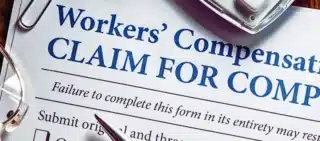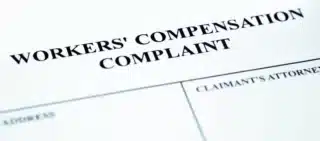
At Strong Law Offices, we have a team of workers' compensation lawyers who understand the financial setbacks and physical limitations...


Mistakes that hurt a workers’ comp claim include not reporting your injuries, not seeking medical attention promptly, or not having accurate and consistent documentation. If you get injured at work, you may claim workers’ compensation benefits for medical treatment and vocational rehabilitation. However, filing a claim can be a complicated process. Unfortunately, many employees end up receiving fewer workers’ compensation benefits than they are entitled to, or losing their claim, due to preventable mistakes.

Although the workers' comp claims process may vary by state, in Illinois, your claim is likely to follow this process:
Employers and insurers typically have greater resources and legal advice than employees. To balance out this disparity, it's crucial to understand your workers’ compensation rights. Knowing your rights can help you navigate the process of filing a claim more easily, as you'll know exactly what's expected of you and what you need to do to ensure coverage. Therefore, you should familiarize yourself with the workers' compensation system in Illinois to cover your bases.
Employees can suffer a variety of injuries due to workplace accidents in Illinois, ranging from lacerations to broken bones.
Performing repetitive tasks, such as typing or working on an assembly line, can result in repetitive stress injuries. These injuries can cause immense discomfort and if not treated in time, they may even prevent an employee from working in the future.
The spine is a complex structure that can be susceptible to various forms of damage, such as shifting, slipping, fracturing, compressing, or overextending. Heavy lifting, getting hit by falling objects, or sudden movements can cause damage to the neck and back. Some of the most frequent types of spinal injuries include herniated discs, muscle strains, pinched nerves, compression fractures, facet joint damage, and spinal cord injury.
Employees can suffer head injuries from accidents such as falls, getting struck by objects, or in incidents of workplace violence. Such injuries can lead to trauma to the skull or brain, which can cause a range of issues like physical limitations, vision problems, memory and concentration difficulties, as well as challenges in managing stress and emotions.
A bone fracture refers to a bone in the body experiencing a complete or partial break in its continuity due to excessive pressure, twisting, or sustained pressure. While broken bones can happen in any occupation, they are more frequent in physically demanding jobs that involve heavy machinery, such as construction. Accidents like slip-and-falls, vehicle crashes, or getting hit by moving objects or machinery can cause fractures.
Other common workplace injuries include:
You should be aware of common errors people tend to make when filing a workers’ comp claim to avoid making them yourself:
In Illinois, you have 45 days to report a work-related injury in writing to your employer to qualify for workers' compensation benefits. Waiting for more than 45 days can disqualify you from receiving benefits.
Failure to report promptly may also lead the workers' comp insurance company to assume that your injury was not serious or that you were not injured at all.
By reporting promptly and completing all the required paperwork, you can ensure that you comply with the workers' compensation rules and prevent any questions or disputes regarding your claim or injury.
It is crucial that you document any work-related injury and the events that led up to it. Inconsistencies in your statements or medical records could cast doubt on your version, leading to having your claim denied. To avoid this, it is best to write down everything you can remember about the accident, including what happened before and after the injury occurred.
Additionally, make sure to collect proof of all medical treatment, including bills, prescriptions, test reports, and scans. Keep a record of all injury-related costs, such as lost wages and medical bills, to save time, money, and energy. By following these steps and keeping detailed records, you can significantly reduce the chances of making errors in your claim and increase the likelihood of receiving your benefits.
Failing to promptly seek medical attention after an injury may lead to worsening of your condition due to overexertion. Additionally, avoiding medical help may create the impression that you do not take your health seriously, which could potentially harm your claim.
It's crucial to adhere to the treatment plan recommended by your doctor. Medical appointments should not be missed as they are necessary to alleviate pain, cure, or reduce the period of disability. It is essential to attend all appointments and only return to work when your physician deems it safe. Failing to attend medical appointments could put your benefits in jeopardy, implying that you may not believe your injury is as severe as you claim. It could also shift the blame of your injury to you if you do not take necessary steps to recover. The insurance company may use your early return to invalidate your claim. Therefore, make sure to follow your doctor's advice to the letter.
When filing a claim, you will be required to provide a detailed account of how the injury occurred and the symptoms you are experiencing as a result. To increase the chances of receiving compensation, you must advocate for yourself and include all relevant information, such as important dates, locations, any prior injuries or illnesses, and evolving symptoms. It is also recommended that you write down everything you remember about the event and any changes in the physical symptoms caused by your injury.
Effective communication with your employer and the insurance company is crucial to avoid delays in the process. You should attend to any extra information or steps required promptly and ensure that you are aware of all the necessary information. Failure to communicate properly can result in the insurance company not receiving important information or documentation related to your claim, which can jeopardize your compensation. Consistency is key, so keep your story the same throughout. It's essential to discuss the details of your case with your workers' compensation lawyer before communicating with insurance companies.
Workers' compensation attorneys can be helpful in handling your claim efficiently, as they are familiar with the process, know any potential mistakes to avoid, and can guide you through it. If you are injured out of state, your lawyer will know how to file a workers’ comp claim out of state. Your attorney will be responsible for ensuring that you avoid any potential mistakes and will handle much of the process for you, including:
Your attorney will know the mistakes that hurt a workers’ comp claim, and how to avoid them. Your lawyer will be able to advise you on whether workers' comp is taxable in Illinois. Having legal representation may help improve your chances of a successful claim and obtaining a higher settlement amount.

At Strong Law Offices, we have a team of workers' compensation lawyers who understand the financial setbacks and physical limitations...

Common Equipment Involved in Run-Over Accidents Illinois job sites, from construction zones to industrial plants, depend on machinery to stay...

Why Do Employers Refuse to File Workers' Comp Claims? While most employers understand their legal obligation to report workplace injuries...